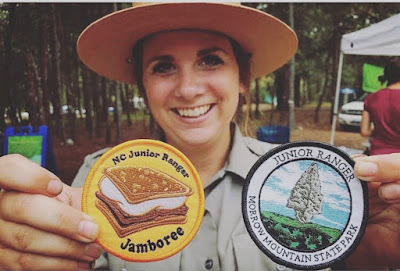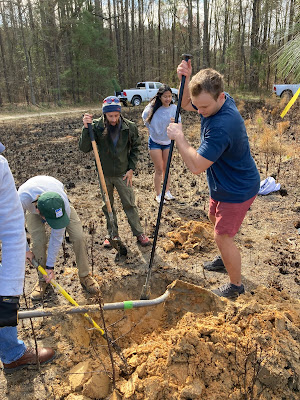Amy Schmitte, the nature and events coordinator for the Foothills Equestrian Nature Center (FENCE) in Tryon recently completed the NC Environmental Education Certification Program. Amy provides environmental education programming for K-5 students in Polk County both at schools and on-site at FENCE. In addition to working with students, she also organizes community outreach evens and coordinates the summer camp programs. In her personal time, Amy enjoys bird watching, exploring local hiking trails, and visiting local restaurants and bakeries.
Amy says she enjoyed all the parts of the certification program, but she especially appreciated the opportunity to travel around the state visiting Environmental Education Centers for workshops or site visits. “I was able to visit many neat facilities and places around the state that I may not have otherwise known about. The program provided great opportunities to meet like-minded individuals and to network with other people in your field.”
When asked what experience stood out for her, Amy says it was the outdoor experiences and especially one program. “There were a lot of great experiences! I think the most memorable experiences are any of the hands-on/outdoor ones. I really enjoyed attending the Salamander Diversity and Biogeography Workshop at Highlands Biological Station. It was an educational workshop with an indoor presentation and an outdoor fieldwork portion. We were able to explore the Highlands Biological station (always a treat!) and then took a field trip to another location with a high Salamander population to work on locating and identifying salamander species.”
For her community partnership project, Amy created a sensory garden using native plants at FENCE to give new life and purpose to some unused garden beds. “I was able to partner with a local elementary school (Saluda Elementary) and their second-grade classes took a field trip to FENCE to learn about plants and animals, learn about how we can engage our senses to explore our environment, and assist in planting the gardens. The students gained a sense of ownership over the gardens, and many talked about their excitement in visiting the garden on future field trips to see how the garden has grown and changed. The garden also benefits the community both humans and animals. By incorporating many native plants into the garden, we have created a space for pollinators to visit, as well as a place for human visitors to explore, enjoy, and engage their senses.”Amy says participating in the program gave her a wealth of knowledge on many environmental topics.
“I feel more confident in my teaching and the program has given me the flexibility to adapt when things don't go exactly as planned. I think the biggest change would be that I am more aware of all the environmental education resources that are available to me when planning lessons and activities and how to access and use them.”
Amy says the program strengthened her views on the effectiveness of environmental education and outdoor experiences for children and adults. “I don't feel that the way I think about environmental issues has changed drastically since beginning the EE certification program but participating in the program has definitely solidified my thoughts on the importance of environmental education. I feel strongly that meaningful environmental education and meaningful outdoor experiences are key in instilling a love and care for the environment in individuals of all ages.”









